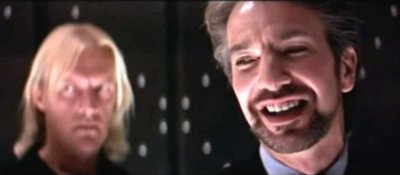I don’t think of Die Hard as being particularly well written, but watching the latter day sequels puts the whole thing in such stark relief that I’m surprised they didn’t get a best screenplay nod for the original Die Hard. Alright, that’s an exaggeration, but things it does well aren’t showy. Fair warning, this post gets pretty deep into the minutiae of the Die Hard movies and only really lists one example, but it’s indicative of a larger trend.
A Good Day to Die Hard came out earlier this year, and was functional but mostly forgettable installment of the series. The extent to which I enjoyed it was purely a function of the fact that I enjoyed previous films. Basically, I like John McClane. One area in which the film fails miserably is villainy. There are a few twists and turns on that front, but towards the beginning of the film, we’ve got this villain that is constantly and incongruously chomping on carrots. It turns out, he’s also a tap dancer.
Now, I’ve never been to film school and I’ve never taken a class in screenwriting, but I imagine lesson 1 being something about giving your villain a quirk that will help the audience identify him. Think of the thought process in the screenwriter’s mind here. He needs a quirk. Shit, everyone loves carrots, let’s have him down carrots faster than Bugs fucking Bunny. But he’s a villain, we need people to hate him too. I’ve got it: Tap dance. Genius. But what are we supposed to get out of this? I mean, yeah, when the McClane boys do take him out, there is a momentary comfort that the world has one less tap-dancer, but is that enough?
In contrast, look at Hans Gruber. In many ways, he is the template for villainy. And he loves the hell out of bespoke suits. There’s an early scene where Gruber and friends are escorting Mr. Takagi in an elevator.
HANS
Nice suit. John Philips…London?
Takagi stares at him, speechless.
HANS
(smiles)
I have two myself.
(beat, as he exits:)
I’m told Arafat shops there too…
It’s an odd moment, and it calls to mind Hans Gruber on his day off, shopping for a suit. It’s a quirk, to be sure, but it’s a subtle one, and it’s not quirk for quirk’s sake. It’s actually quite well placed and it even serves multiple purposes.
Gruber is playing a stereotyping game with everyone. He’s playing the role of terrorist to a tee, but his comment on the suit is odd precisely because it doesn’t quite fit with that stereotype. It fits more with the effete, snobby European stereotype, I guess, but even moreso, it fits Gruber’s ultimate motivations: money. This odd exchange at the beginning of the film is actually the first hint that we’re not dealing with your garden variety terrorists here. Later, we find out they’re simple thieves. The whole thing is just a big robbery. And of course the man orchestrating the whole event is obsessed with the trappings of money, like, say, expensive suits.
It’s not obvious or on the nose. In fact, you’re probably not supposed to notice it at all, except perhaps in your subconscious. It lays the groundwork for the robbery without being overt. It’s a quirk and it gives Gruber depth, but it’s not stupid and it fits organically with the story. It’s the sort of thing you can actually believe.
Again, this is a tiny nit to be picking, but it’s indicative of how well the first Die Hard fits together… and how poorly the most recent installment works. Next time on Minutae of Die Hard: we spend 5000 words on the guy who played Endo in Lethal Weapon, and his decision to let his guard down so that he can snack on some candy bars even while the police are assaulting the building.
